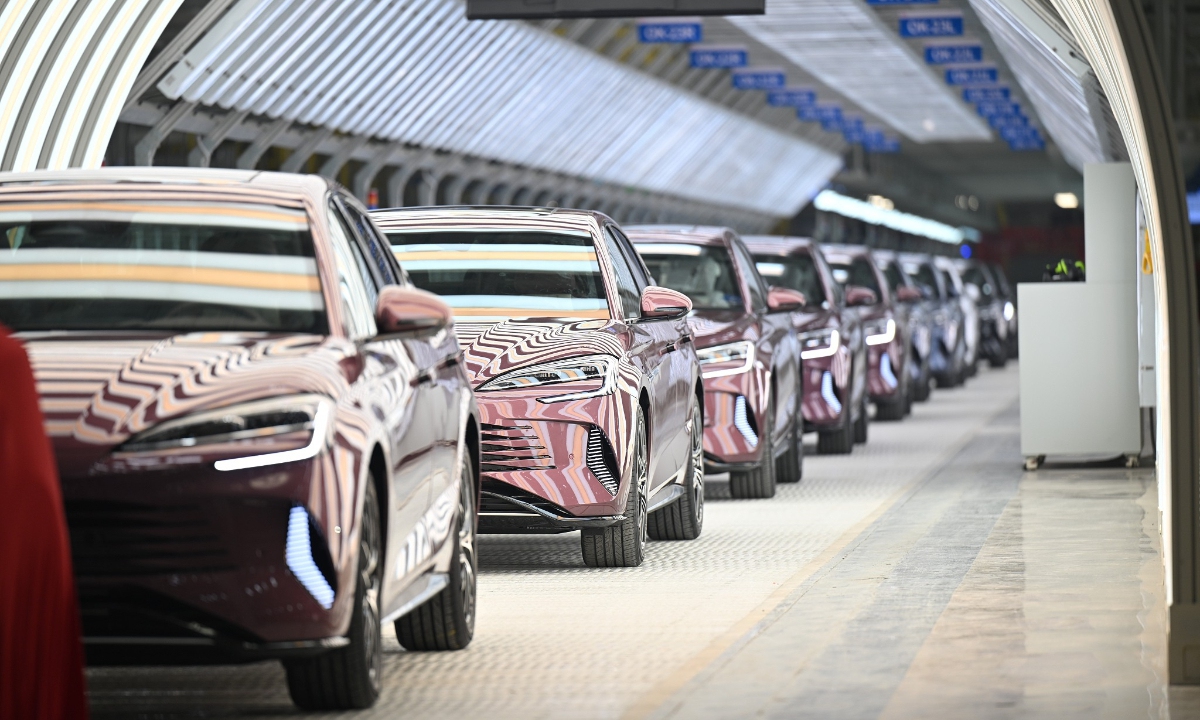
EV Photo:VCG
Chinese commerce officials have recently held intensive meetings with Chinese enterprises operating in European countries including Spain, Portugal and Greece, calling for China and the EU to accommodate the legitimate concerns of both parties and avoid an out-of-control escalation of trade friction through talks, as the European Commission (EC) is reportedly set to disclose planned tariffs on Chinese electric vehicles (EVs) this week.
Observers said on Monday that China-EU economic and trade relations will get worse if the EU decides to impose additional tariffs on Chinese EVs, and the effects of the tariffs and the "decoupling" this may cause to bilateral relations will be catastrophic for Europe.
Chinese Minister of Commerce Wang Wentao said that accusations of "unfair competition" against China are groundless, and that fair competition is the consensus of all countries and the cornerstone of international exchanges, and it cannot be defined by a few countries.
"China welcomes healthy competition and opposes any form of vicious competition designed to stifle growth," Wang said during a roundtable meeting with Chinese businesses in Lisbon, Portugal, last week.
Less than one month after the US imposed additional tariffs on Chinese EVs, the EU is anticipated to disclose this week the tariffs it plans to impose on Chinese EVs, Reuters reported on Monday.
The EU is more divided than ever on the issue of additional tariffs on Chinese EVs. German Chancellor Olaf Scholz said at an event on Saturday marking the 125th anniversary of carmaker Opel's Rüsselsheim plant that Germany does not believe in closing its markets to foreign competition.
Protectionism and customs barriers in contravention of trade rules "simply make everything more expensive and all of us poorer," he said, the German Press Agency reported.
Within the EU, there has been growing opposition to imposing additional tariffs on Chinese EVs, and thus the EC is unlikely to impose tariffs on Chinese EVs as high as the 100 percent imposed by the US, Sun Yanhong, an expert of European affairs in Beijing, told the Global Times.
Sun said that the EU might impose tariffs of around 10-20 percent. However, China will come up with countermeasures to respond to such a move, Sun said.
Eventually, the growing China-EU economic and trade cooperation will bear the brunt and the EU should take the blame, she said.
More than 40 Chinese companies operating across Europe voiced grave concerns about the EU's escalating protectionism during the meetings with Chinese commerce officials, according to a statement that the China Chamber of Commerce to the EU (CCCEU) sent to the Global Times on Sunday.
They called on the Chinese government to address urgent issues, including the EU's anti-subsidy investigation into Chinese-made EVs and Brussels' use of unilateral tools such as the Foreign Subsidies Regulation that specifically target Chinese enterprises, it said.
China-EU industrial, supply and value chains are deeply integrated, and their economic and trade ties cannot be cut by political force, Feng Zhongping, director of the Institute of European Studies at the Chinese Academy of Social Sciences, told the Global Times on Monday.
Punitive tariffs and protectionism do not conform to each other's benefits and the EU must meet China halfway to avoid a potential trade war, Feng said.
"It's not scary to see trade friction between China and the EU given their large bilateral trade volume, and the key lies in attaching importance to each other's concerns and dealing with problems through discussion," he said.
Ferdinand Dudenhöffer, director of the Center for Automotive Research at University of Duisburg-Essen, told the Global Times in an interview via email that "The aim [of the planned tariffs] seems to be to distance ourselves from China."
"The effects of this 'decoupling' and the punitive tariffs are catastrophic for Europe," he said. On the one hand, China is the world leader in technology for the car of the future. On the other hand, China is the largest car market in the world and the largest market for luxury cars. Without China, you can forget about the German car industry. If you are not in the Chinese market, you are not in the car business, he said.
Should the EU impose a 20 percent import tariff on Chinese electric cars, as speculated, it would have a notable impact on bilateral trade and production in Europe, according to a report released by German think tank Kiel Institute for the World Economy on May 31.
For consumers, this is likely to result in higher prices for EVs because production within the EU is significantly more expensive than in China due to higher energy and material prices and, above all, significantly higher labor costs, it said.




